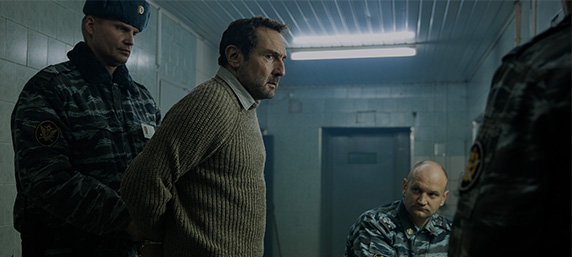LSJ Media and Sony Pictures have 10 double tickets to give away for a special preview screening of A Man Called Otto.
Based on the comical and moving # 1 New York Times bestseller, A Man Called Otto tells the story of Otto Anderson (Tom Hanks), a grumpy widower who is very set in his ways. When a lively young family moves in next door, he meets his match in quick-witted and very pregnant Marisol, leading to an unlikely friendship that will turn his world upside-down. Experience a funny, heartwarming story about how some families come from the most unexpected places.
The preview will take place on December 19 at Event Cinemas George Street. Watch the trailer here.
A Man Called Otto is in cinemas New Year’s Day. To enter, please email your name and LawID number to [email protected], with the subject line “Man Called Otto giveaway” by Monday 5 December at 5pm
Stars at Noon
4 out 5
No other filmmaker adds depth to their characters quite like Claire Denis. The French auteur has an idiosyncratic way of adding conflicting details that don’t feel like contradictions. That is not to say that the characters are easy to categorise – their actions and thoughts contradict themselves, and their morals are grey. Yet the balance Denis achieves for each is so perfect that they seem genuinely human. And, after all, humans are horrible little creatures, selfish and jealous: we love out of self-interest, and show our fragility only if we can get something out of it.
An example is Trish (Margaret Qualley), the protagonist of Denis’ new film, Stars at Noon, her second of the year (oh, we mere mortals don’t deserve this bonus in a single year). She’s a young go-getter journalist stranded in Nicaragua. She’s trying to find her way out of the country after having her passport confiscated by authorities. The embassy is a no-go, and her editor (a little cameo by John C. Reilly) refuses to help. Trish is on her own, so it’s good that she’s as resourceful as they come. This includes sleeping with a person of high military status – anything to make life easier.
On one of her visits to the International Hotel seeking diplomats who can help with her plight, Trish meets Daniel (Joe Alwyn), a charming British businessman.
He could be a way out, but no one is in Nicaragua for altruistic reasons, and Daniel is purposefully mysterious. His involvement with shifty Costa Rican diplomats puts a target on his back and, consequently, Trish’s. The two start a game of hide-and-seek with other foreign spies, Nicaraguan officials and the CIA, leaving a trail of destruction wherever they pass.
Starts at Noon is a compelling thriller. Denis never sticks to one genre, figuring she can bring her own voice to each one and build one of the most varied filmographies in history. She did it with sci-fi (High Life), she did it with horror (Trouble Every Day), and romantic comedy (Let The Sunshine In). Why not take on the spy thriller? The only common thread in all these films is that we can expect Denis to subvert the rules of the genre and that the soundtrack will be made by the English chamber-rock outfit Tindersticks. In all other respects, anything goes.
Of all Denis’ films, the one Stars at Moon reminds me most of is her 2009 African-war drama White Material. Both are centred around a white female protagonist in a colonised country. Both cause the audience to view the socio-political background through the perspective of a character who understands the milieu without being patronising or exploitative. In White Material, Denis doesn’t shy away from showing the footprint of France’s destructive colonial project. In Stars at Noon, she constantly reminds the characters that Central America’s political turmoil is a direct consequence of the US’s post-colonial policies and capitalist focus. In a damning moment, Trish tries to exchange money in the black market and uses every possible aspect of corruption to get her way. Someone reminds her that the country’s problems come from America’s meddling in their politics. Corruption in this locale has its roots elsewhere.
The book the film is based on, by writer Denis Johnson, is set during a revolution. The filmmaker made the decision to change the setting to 2020, in the midst of the pandemic. It’s not because this is a world recognisable to the audience, or a comment on oppression by the state. Instead, it’s fitting that the country is ravaged by both a literal foreign virus (COVID-19) and a metaphorical one (capitalism).
The political background is of little interest to either Trish or Daniel. She’s patiently waiting for an opportunity to leave. And he understands that his plan – whatever it was – has run its course, and escape is the only option.
But what can two attractive people do in a hot, sweaty Central American country while they wait for the right time to escape? Indulge in a torrid romance, of course. It’s funny how political spy thrillers are plot-heavy, with one intermission where our spy hero beds a romantic interest. Still, in Denis’ bending of the genre, the luridness of the relationship is front and centre. And it makes sense. The politics are too complicated to be reduced to a two-hour-long film. There is no attempt to explain every detail, because all the problems can’t be attributed to a single factor. Nicaragua is ground zero where a million interests converge, none of them containing a shred of humanity or an iota of help to the people who live there. While the Nicaraguans maintain their equanimity with good food and rum, the influence of foreign agents is catastrophic.
For the two main protagonists, instead of trying to wrap their heads around the political plotting surrounding them, it’s a case of waiting it out. In bed. And naked.

Kompromat
3 out 5
From one French thriller to another. Jérôme Salle’s Kompromat is by the numbers, and effective. It follows the correct rules of the genre with an ironclad script. And meanders through a complicated diplomatic issue with the intent just to entertain – and entertain it does.
Based loosely on an actual event, it follows the story of Matthieu (Gilles Lelouche), the director of Alliance Française, in a remote Siberian town, falsely accused by the Russian authorities of owning child pornography. The charges seem politically motivated, and the images are doctored. But the French embassy is powerless to act. Matthieu is left to his own devices, but fortunately has the help of Svetlana (Joanna Kulig), a French-speaking Russian with connections to the Secret Police, who takes a shine to him.
You’ll understand if I say that Kompromat is, thankfully, a French film. Unfazed by Hollywood interests, meddling producers and the input of financiers, Salle and his screenwriter Caryl Ferey get to keep the plot tight and straight to the point. There’s no interest in developing backstories or extra context, and yet most threads are well tied up in the end. There is heart, and an overdramatic climax to punctuate the drama.
Still, it’s all relatively solid, with very few corners cut. For example, it’s on purpose that Salle and Ferey leave the reasons for the bogus charges wide open while having fun causing the audience to speculate about this. Was it because Matthieu organised a ballet performance where two male dancers kissed on stage, infuriating a local businessman? Was it because he once danced with Svetlana, the daughter-in-law of a local ex-KGB member, currently part of the Secret Service? Was it to teach the French a lesson amidst intense political negotiations? Was it because he dressed like a princess to play with his daughter? Who knows? Who needs to know? None of those reasons will change the fact that Matthieu needs to escape the country before he’s sent to prison. If not, he will most likely be murdered by the inmates, who will believe in the damning charges.
After a violent stint in prison, Matthieu is placed under house arrest while waiting for trial. And it’s there that he concocts the plan to escape and make his way towards the Mongolian border. So, in its second half, Kompromat becomes a man-on-the-run film, The Fugitive in Siberia. I’d be lying if I said I didn’t find that half of the picture more and more exciting as events unfolded.
As Matthieu’s case gains more notoriety, it becomes harder for him to slip away unnoticed. To make things worse, it’s the peak of winter. And, the closer he gets to his destination, the more difficult it is to find a trusty ally.
On top of that, the police call for the services of Sagarine (Igor Jijikine), the kind of ex-KGB spy who gets things done no matter the consequences. Sagarine barely smiles, barely shows any personality. He’s utterly devoid of any moral blueprint. He would kill a child if this would enable him to achieve his goal. In fact, I bet he once did.
Kompromat is the kind of film I can see Hollywood remaking with its own version of the everyday-man-turned-hero – a Matt Damon-like actor. The premise is strong enough, and, for all that it’s worth, Russia is back to being everyone’s favourite villain. But an American perspective here would cheapen the story, even if the French succumb to an easy way out at the end. The protagonists find time to sleep together at the most inopportune time, and there’s a final chase that is a bit too over the top, though endearingly cathartic.
Still, a good time in the cinema is a good time in the cinema, and for fans of the spy thriller genre Kompromat is a safe addition. It doesn’t reinvent the wheel, because Salle probably doesn’t have the talent to go that far, but sticking to what you know how to do is already halfway to making a good film. And Kompromat is a good film.




